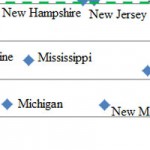James Kennedy: Asking the Right Questions on Tolls and Roadways
Success requires not just answering the questions right, but also making sure that the questions that are asked are the right ones.
I wrote here at Anchor Rising & the Ocean State Current that, when it comes to infrastructure, Governor Raimondo has the right answer to the question, “Who pays?” If we’re going to build a road system whose most expensive design features are in place for the benefit of truck traffic, then it’s fair that trucks should pay for that road system.
Getting the answers right isn’t enough, though. What are the other questions we should be asking? If “Who pays?” is question number 2, question 1 is, “What should we build?” There’s a lot hidden in plain sight that neither the pro-RhodeWorks or anti-RhodeWorks crowd is absorbing. Asking the right questions should help change that.
We can take the word of truck drivers that they can’t pay more and also be critical of the fact that those same truck drivers don’t nearly come close to paying for costs of their use if we also examine the third dimension of the question: What kind of infrastructure — and how much of it — do we have?
Under RhodeWorks, trucks would pay 50% of road costs, up from just under 20%. Trucks create 75% of road damage, according to a Budget Office report shared at the Statehouse Finance Committee in June 2015. So in the bigger picture, even though truck tolls raise gross revenue, they don’t catch up to the costs of infrastructure. They’re a net loss.
When you have a stand selling a $0.75 cup of lemonade for $0.50, the loss can’t be made up on volume. The reason this arrangement of overbuilding infrastructure and undercharging for it looks like a net gain is because other funds — almost half of them from general funds — bridge the cost difference. Almost every new highway bridge we build is therefore a financial liability, even in the best-case scenario. The solution to our transportation funding must include a fair user fee that also balances this question of overbuilt infrastructure, so that costs can be brought into line with our state’s actual needs.
Truck drivers have insisted that they will divert from Rhode Island roads if they are tolled. On its face, this is hard to believe, because our neighbors have tolls on their roads as well or are planning them soon. Without meaning to, truck drivers are indicating how redundant our road system is. We need a certain quantity of truck-ready roads to deliver goods to our homes and businesses. Truck drivers are saying they’ve got plenty of options. We’re at the point of diminishing returns on our investment. Providence is, in fact, number 8 in the United States for its quantity of highways per capita. That means an extra cost per capita, too.
This would all be very compelling on its own, if not for the fact that half the cost of the proposed road work lies in a short stretch of road that more-or-less redundantly mirrors I-95. It’s not just that trucks could divert to Massachusetts or Connecticut easily to get goods to market. Even within Providence, trucks have ample opportunities to get freight moved without needing another 6/10 Connector. The 6/10 Connector has soured everything around it, at great cost and to little utility.
Another question: We’re going to rebuild it why? Don’t rebuild the 6/10 connector.
Economists tell us that what people do with their money says more about their preferences than what they say about their preferences. Truck drivers, like any of us, would no doubt like an endless supply of the goods and services they use at zero cost, and many of the objections raised to tolls flow from this basic human instinct to freeload. We’d like to have our cake and eat it too.
But truck drivers are also saying that they’ve had three pieces of cake today and don’t want any more of ours, even if we discount it to half price. Why would we keep making cake?
James Kennedy writes for the blog Transport Providence (follow on Twitter), and has appeared in left- and right-leaning publications across the country. He’s interested in zoning deregulation, highway-to-boulevard conversions, frequent transit, and protected bike lanes.


